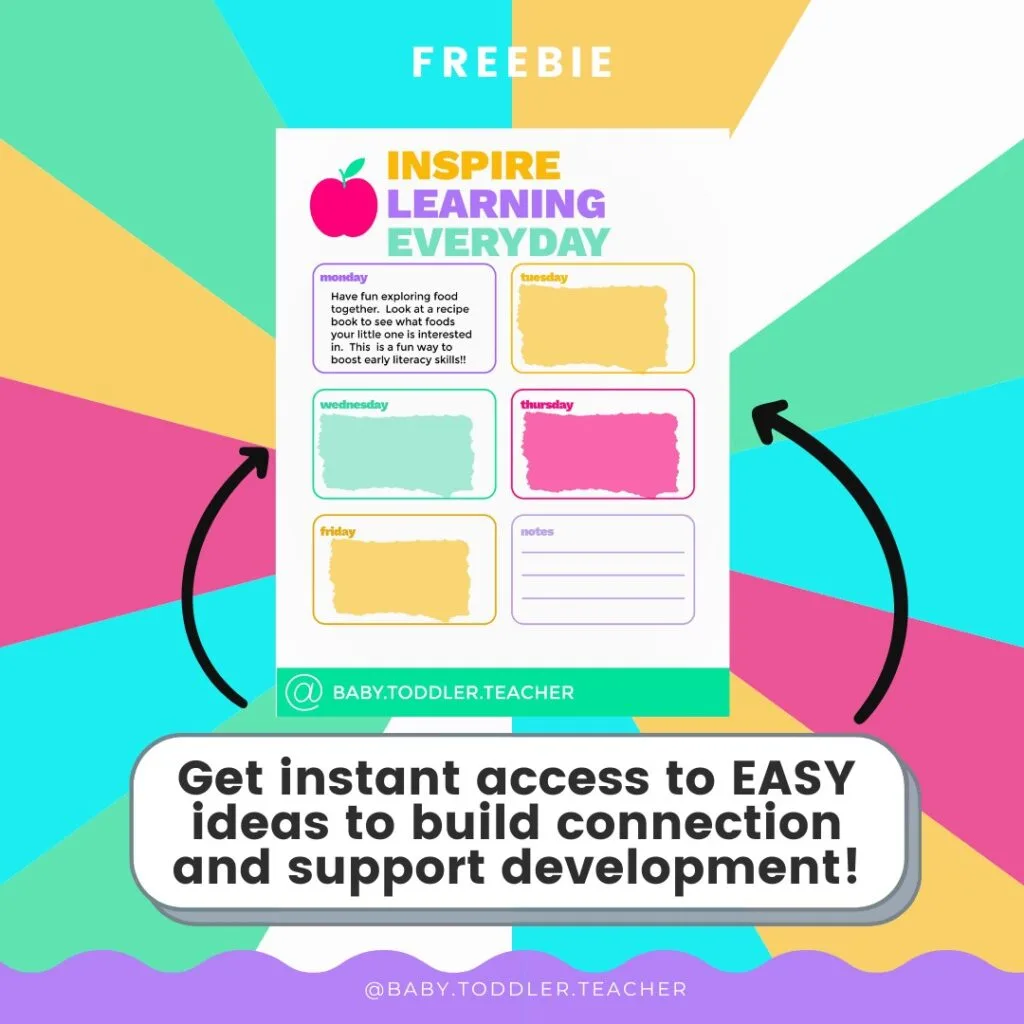Early Literacy is More than Just Reading Books!
Do you know that for young children, every day comes with countless opportunities to build a strong foundation in early literacy skills?
Yes, reading books with your little ones is excellent.
It’s a time-tested classic, and there are lots of benefits to doing just that.
But did you know there are even more different ways to encourage these skills throughout your child’s day?
This blog post will introduce you to some of my favorite early literacy activities, all easy to do and fun for toddlers.
These activities will help them grow their love for learning, while also giving them a head start on their educational journey.
Let’s dive in!
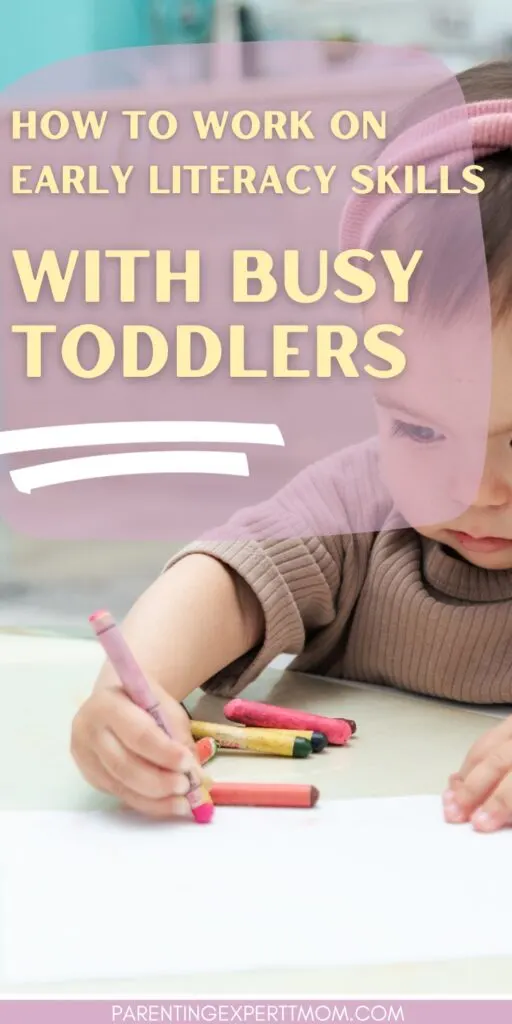
(This post may contain affiliate links. To read our full disclosure policy click here.)
What are Basic Literacy Skills
Basic literacy skills for toddlers encompass a range of abilities that set the groundwork for a child’s future learning and education.
These skills are not just about recognizing and writing the alphabet or simple words, but they also involve developing fine motor skills, language skills, and problem-solving skills.
Fine motor skills are crucial for toddlers as they enable children to make the necessary movements to write, draw, and manipulate small objects.
These skills are the stepping stones towards writing their first letter or word.
Language skills, on the other hand, are the backbone of early childhood education, fostering a child’s ability to comprehend and communicate effectively.
As young kids’ vocabulary grows, they begin to understand the meaning of the written word and its practical use.
Problem-solving skills are another essential element of basic literacy.
These skills encourage toddlers to think critically, and they are introduced through activities that require the child to make decisions and solve problems.
Whether the task is to figure out the sequence of a story or to match objects and their corresponding words, these activities promote understanding and logical thinking, crucial components of literacy.
In summary, basic literacy skills play a vital role in preparing toddlers for their educational journey.
They lay the foundation for reading, writing, and critical thinking, essential for a child’s academic and personal growth.
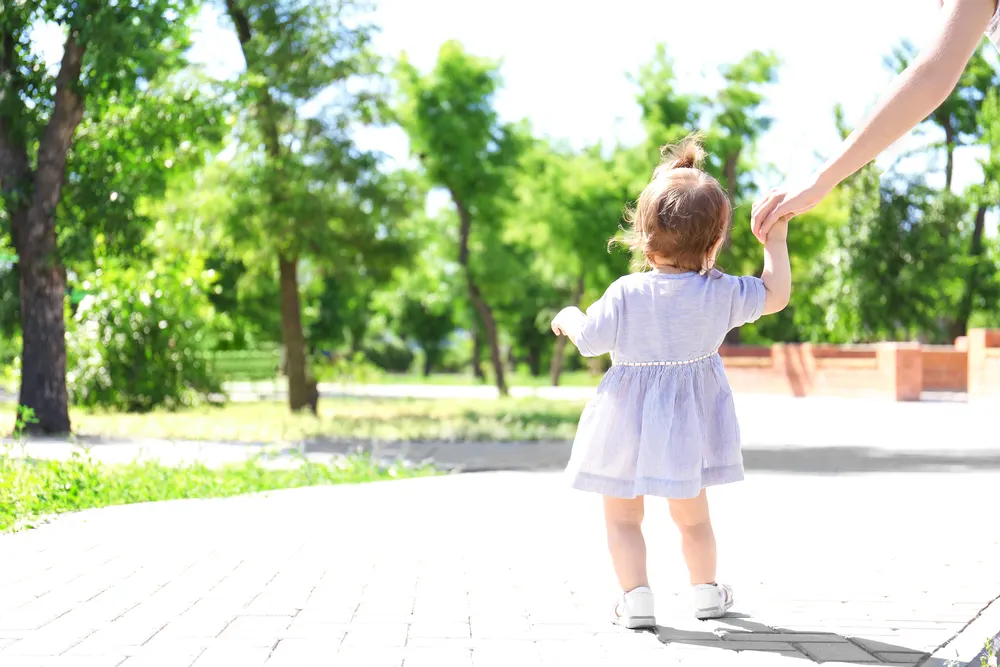
Everyday Activities Give us Lots of Opportunities
Did you know that ordinary daily activities are some of the best ways to build early literacy skills in your little one?
Yes, that’s right! From the minute your child wakes up to the time they go to bed, there are plenty of chances to introduce them to new words and symbols.
One of the first things children start to recognize are symbols, like stop signs and other street signs.
When you are out and about with your child, point to these signs.
Tell them what they are and what they mean.
You can turn this into a fun game by asking them to spot different signs while you are on your walk or drive.
You can even do this with fast food or store signs.
You may be surprised just how quickly they can spot their favorite restaurant or store!
Everyday items can also be great tools for early literacy.
For example, when you’re preparing for a trip to the grocery store, have your child help you write the shopping list.
This can be a fun activity that not only teaches them new words but also helps them understand the concept of a list.
They might not be able to write the words yet, but they can draw the items or contribute by adding items they remember.
Remember, the early years are a critical time for literacy development.
So, let’s make the most of our day by turning simple acts into valuable learning experiences!
Singing: A Free and Fun Way to Boost Early Literacy
Did you know that singing is an excellent activity for boosting your child’s literacy skills?
That’s right!
This fun and free activity can easily be included in your daily routines.
Singing exposes toddlers to new words and phrases, enhancing their vocabulary and language understanding.
When we sing songs, often we repeat lines or verses.
This repetition helps kids remember and learn new words!
Plus, the rhythm and rhyme in songs make it easier for them to remember the words and their meaning.
You don’t need to be a superstar singer to start this activity.
You can sing nursery rhymes or favorite songs that you already know.
Not sure of the lyrics?
No problem!
You can easily look up songs online.
And the best part?
You and your child can also create your own songs!
Making up songs together can be a fun way to learn new words, express creativity, and bond.
So, why not make singing a regular part of your day?
You could have a sing-along time in the morning to kick-start the day, or you could sing lullabies before bedtime.
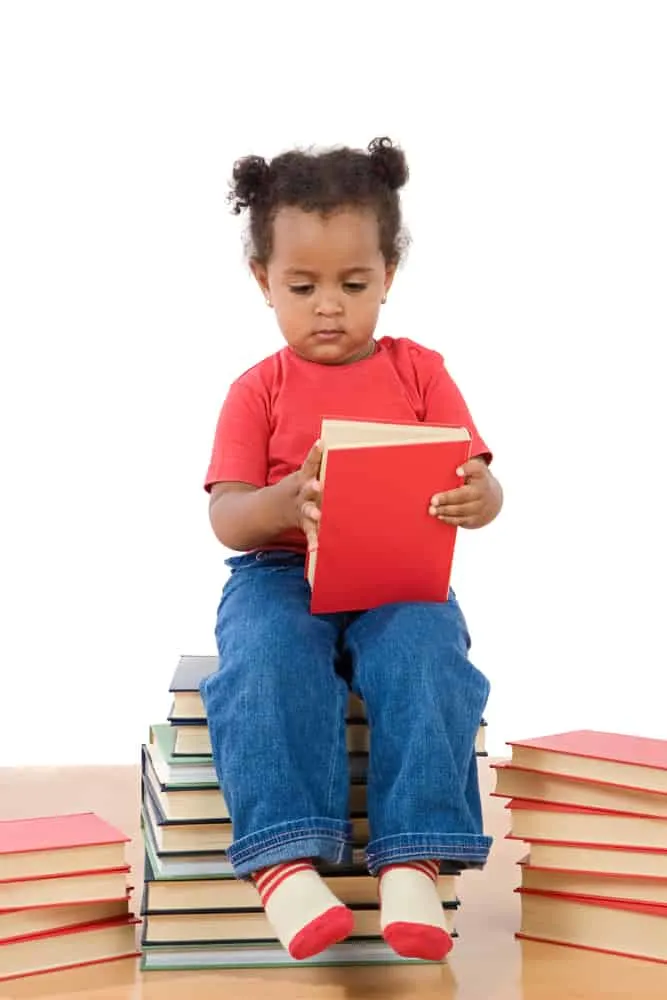
Encourage a Love of Books
Cultivating a love for books in young children is one of the most important things parents and caregivers can do to promote literacy.
Reading books together is not only a fun way to spend time but also an excellent way to introduce new words, ideas, and worlds to kids.
Picture books, with their vibrant illustrations and engaging stories, can spark a child’s imagination and curiosity.
They can make reading a fun and magical experience as toddlers begin to associate words with images.
It’s also essential to let children explore books on their own.
Even before they can read, toddlers can look at the pictures, turn the pages, and pretend to read stories they remember.
This kind of play is an important step in building their love of reading.
Trips to the library can be an exciting adventure for little ones.
A library is a place full of endless stories, where they can find their next favorite book.
By allowing children to choose their own books, parents can foster a sense of independence and confidence in their reading skills.
They’ll soon realize that reading books can open up new enchanting worlds of adventure, wonder, and learning.
So, let’s start this journey, and watch as a lifelong love of reading blooms in our children.
You can see some of my favorite books for toddlers here.
Making Reading Fun: Tailoring Strategies for Toddlers
When it comes to making reading fun for your little ones, a personalized approach works best.
Start by picking books about topics your child loves.
If your toddler is fascinated by dinosaurs, for example, there are plenty of children’s books that feature these prehistoric creatures.
These books can spark their imagination and curiosity, making reading a fun and exciting adventure.
Interactive books are also a great hit with toddlers!
These are books with different textures to touch, flaps to lift, or buttons to press.
Such books make reading a hands-on experience, engaging the child’s sense of touch and keeping them invested in the story.
When you sit down to read with your child, remember to follow their lead.
If they want to skip a page or two, that’s fine.
The goal is to make reading enjoyable, not a chore.
If they want to linger on a page they find particularly interesting, let them explore it to their heart’s content.
Lastly, remember there’s no rule that says you must read the book word for word.
Instead, make the story interactive.
Talk to your child about the pictures, ask them questions, or let them tell their own version of the story using the pictures as a guide.
By using these strategies, you can make reading a fun, engaging, and exciting experience for your toddler, setting them up for a lifelong love of books and reading.
Building Early Literacy Skills During Playtime
Playtime is not just for fun, it’s also a fantastic way to build early literacy skills!
Playing allows younger children to explore and express their thoughts in a playful way, which can help enhance their communication skills and writing skills.
A good idea is to encourage children to act out their favorite stories from their books.
For example, if they love a story about pirates, you could plan a ‘treasure hunt’ game.
This kind of imaginary play can encourage them to think creatively and use new words, boosting their language skills and sparking their child’s imagination.
Also, pretend play, like playing restaurant, can be an excellent opportunity for writing and drawing.
Let them create their own menu!
They can draw pictures of the food, and if they’re ready, they can try to write the names of the dishes.
This process can help them connect words with the images they have drawn, enhancing their understanding of words and symbols.
It’s all about having fun while learning! So, let’s turn playtime into a fun and imaginative literacy-building activity.
Sensory Play: A Fun Method to Enhance Writing Skills
Sensory play is all about using our senses to explore the world around us.
It means playing and learning with materials that we can touch, see, smell, and even taste!
Have you ever thought about how much fun your child has when they play in a sandbox, mold play dough, or splash around in water?
Well, along with being a lot of fun, these sensory play activities are fantastic for building early writing skills.
When children dig in a sandbox or shape play dough, they are using their fingers and hands.
This helps them to improve their fine motor control, which is the ability to make small, precise movements.
Think about it – writing involves holding a pencil and moving it in specific ways to form letters.
So, playing in a sandbox or with play dough can be like a fun exercise for those little hands!
Splashing around in water is another fun sensory play that can help build writing skills.
Your little one is not only enjoying the cool water but also strengthening their muscles as they scoop, pour, and stir.
These movements are similar to the ones used in writing, and practicing them during play can help to develop these skills further.
In a nutshell, sensory play is not just playing, it’s also a great way to help your child develop their writing skills.
So next time you see your little one playing in a sandbox or with play dough, remember they are also practicing to become a future writer!
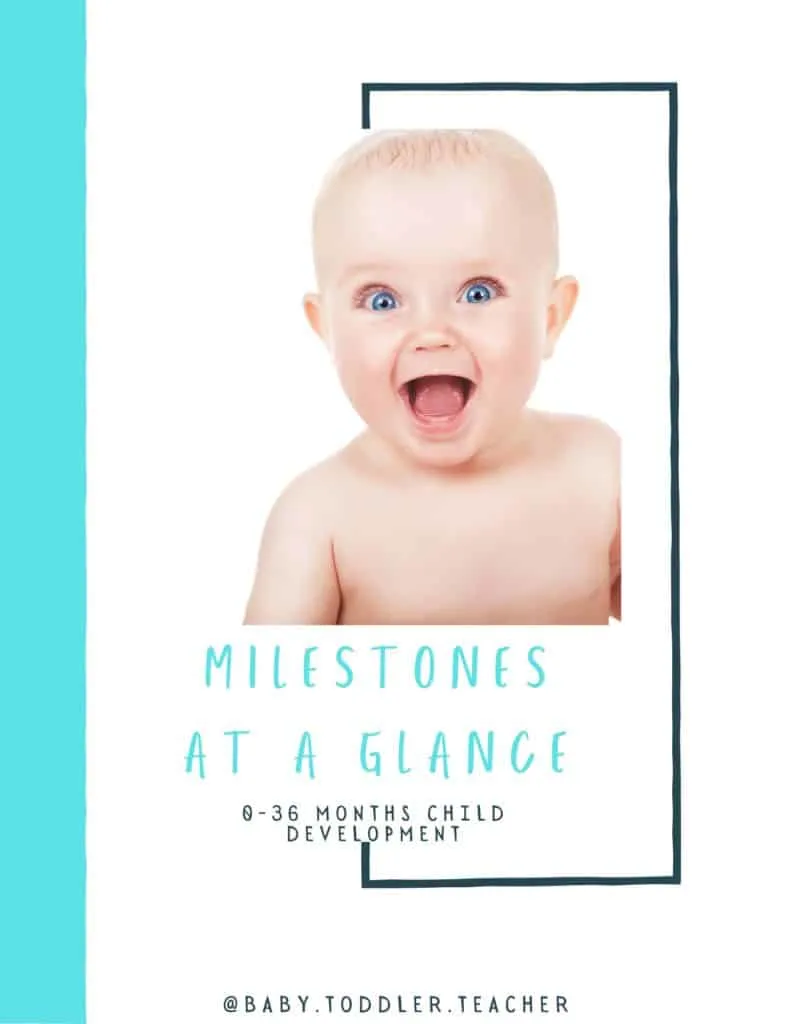
Grab your FREE Milestone Guide HERE.
Have fun building new skills together!
In conclusion, helping your little ones develop early literacy skills is something that can happen throughout your whole day, not just during ‘learning times’.
Family members, from parents to siblings, can turn ordinary activities into fun literacy activities.
When you’re on a walk, use street signs to introduce new words, or when you’re at the grocery store, involve your child in making the shopping list.
Playtime, too, is a great way to boost these essential skills.
You can create games where your child acts out stories, or encourage them to draw and write their own menus during pretend play.
And let’s not forget the magic of books and nursery rhymes!
Reading together or letting your child explore books on their own can cultivate a deep love for reading.
And singing nursery rhymes?
It’s a classic activity that helps them learn rhythm and new words.
So, with all these fun and simple ways to build literacy skills, let’s make each day a learning adventure for our little ones!
Frequently Asked Questions
Some literacy activities for toddlers include reading books together, exploring books on their own, trips to the library, imaginative play, sensory play, and singing nursery rhymes.
You can help your child develop writing skills through everyday activities such as involving them in making shopping lists or creating menus during pretend play. Additionally, activities like playing in a sandbox or with play dough can help strengthen their fine motor control, which is essential for writing. Encouraging them to act out stories from books or create their own stories through drawing and writing can also enhance their writing skills.
Some ways to make reading more enjoyable for toddlers include choosing books that interest them, reading together with your child and involving them in the story, asking questions to engage their imagination, and making funny voices and sound effects while reading. You can also try incorporating props or actions into the story to make it more interactive and engaging for your child. Overall, letting your child choose their own books and creating a fun and positive atmosphere around reading can go a long way.
Related Posts You Will Enjoy
How to Handle Toddler Screaming and Why it Happens
Complete Guide to the Best Toddler Climbers in 2023
Toddler Hates Getting Dressed? Try this!
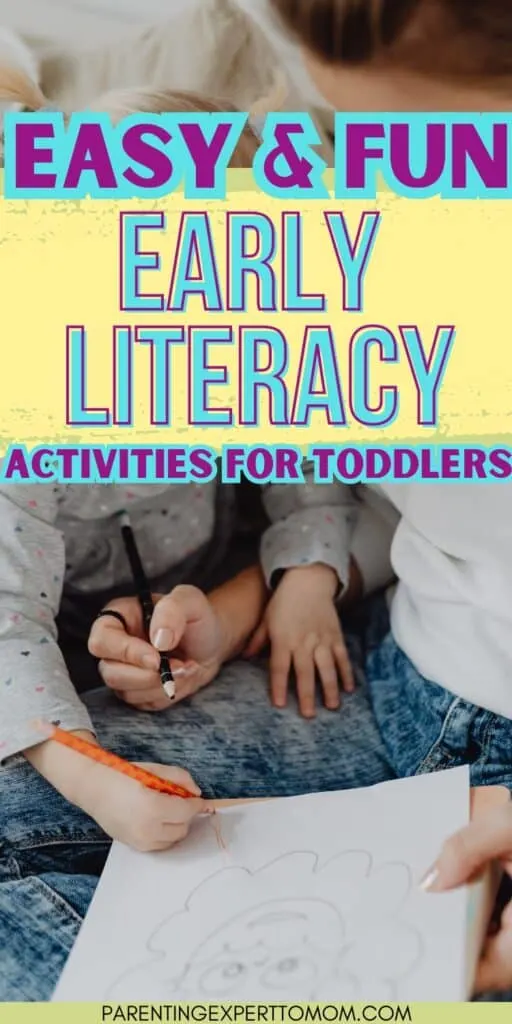

Kayla O’Neill has a master’s degree in education as well as a bachelor’s degree in special education with an emphasis in early childhood education. She has been working as a developmental therapist with babies and toddlers in early intervention since 2012. She is also a mom with two young children.
